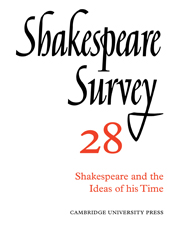Book contents
- Frontmatter
- ‘Richard II’ and the Realities of Power
- The Politics of Corruption in Shakespeare’s England
- Literature without Philosophy: ‘Antony and Cleopatra’
- Self-consciousness in Montaigne and Shakespeare
- ‘Measure for Measure’: The Bed-trick
- Shakespeare and the Doctrine of the Unity of Time
- ‘Coriolanus’ and the Body Politic
- ‘Titus Andronicus’, iii, i, 298–9
- ‘The Merchant of Venice’ and the Pattern of Romantic Comedy
- The Integrity of ‘Measure for Measure’
- ‘To Say One’: An Essay on ‘Hamlet’
- ‘The Tempest’ and King James’s ‘Daemonologie’
- Sight-lines in a Conjectural Reconstruction of an Elizabethan Playhouse
- The Smallest Season: The Royal Shakespeare Company at Stratford in 1974
- The Year's Contributions to Shakespearian Study 1 Critical Studies
- 2 Shakespeare’s Life, Times, and Stage
- 3 Textual Studies
- Index
- Plate section
‘The Tempest’ and King James’s ‘Daemonologie’
Published online by Cambridge University Press: 28 March 2007
- Frontmatter
- ‘Richard II’ and the Realities of Power
- The Politics of Corruption in Shakespeare’s England
- Literature without Philosophy: ‘Antony and Cleopatra’
- Self-consciousness in Montaigne and Shakespeare
- ‘Measure for Measure’: The Bed-trick
- Shakespeare and the Doctrine of the Unity of Time
- ‘Coriolanus’ and the Body Politic
- ‘Titus Andronicus’, iii, i, 298–9
- ‘The Merchant of Venice’ and the Pattern of Romantic Comedy
- The Integrity of ‘Measure for Measure’
- ‘To Say One’: An Essay on ‘Hamlet’
- ‘The Tempest’ and King James’s ‘Daemonologie’
- Sight-lines in a Conjectural Reconstruction of an Elizabethan Playhouse
- The Smallest Season: The Royal Shakespeare Company at Stratford in 1974
- The Year's Contributions to Shakespearian Study 1 Critical Studies
- 2 Shakespeare’s Life, Times, and Stage
- 3 Textual Studies
- Index
- Plate section
Summary
The Tempest offers a twentieth-century audience more problems for a full understanding than most of Shakespeare’s plays, and these problems are the more insidious because action, language and characters seem transparently clear. Yet the play is highly intellectual and despite the work of scholars who have explored many of the ideas raised by the varied but scant sources there remain elements that still seem to fit uneasily, and one character, Caliban, who eludes even the simplest definition. This essay seeks to develop two aspects of contemporary thought by means of which Caliban can be seen not more clearly but in even greater complexity, and it proposes King James’s Daemonologie as a possible source for these ideas. Contemporary beliefs about devils could, of course, be found elsewhere, but James’s relationship to Shakespeare as patron of the King’s Men, the clarity and dialectical skill of his Daemonologie as well as its content make the King’s famous work a likely source for some of the ideas of Shakespeare’s strange play.
The problem of Caliban's birth, while receiving little attention on its own account, crops up from time to time in more general discussions of The Tempest. Unfortunately, though many critics agree that Caliban is the touchstone by which the civilised world is judged, his actual status - human, sub-human or demi-devil - is rarely subjected to close examination, and critics tend to take the view which suits their particular interpretation of the play.
- Type
- Chapter
- Information
- Shakespeare Survey , pp. 117 - 124Publisher: Cambridge University PressPrint publication year: 1975
- 3
- Cited by



